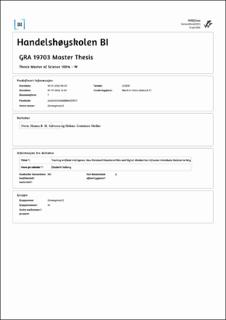| dc.contributor.author | Salvesen, Hanna B. H. | |
| dc.contributor.author | Møller, Helena Tournaire | |
| dc.date.accessioned | 2022-11-29T12:34:36Z | |
| dc.date.available | 2022-11-29T12:34:36Z | |
| dc.date.issued | 2022 | |
| dc.identifier.uri | https://hdl.handle.net/11250/3034746 | |
| dc.description | Masteroppgave(MSc) in Master of Science in Leadership and Organizational Psychology - Handelshøyskolen BI, 2022 | en_US |
| dc.description.abstract | In this thesis, we aim to investigate how domains of perceived situational
risk will influence an individual’s decision to rely on an artificially intelligent
decision aid to perform a decision-making task. We also aim to investigate how an
individual’s digital mindset beliefs can make the risk factors inherent in the
situation more salient. We draw from research on organizational trust, trust in AI
technology and decision aids, and implicit theories of mindsets to explore this
connection. Our study examined 192 participants’ digital mindset and their
perceptions of situational risk using an experimental vignette design survey. In our
results, we uncovered that there is a negative relationship between specific domains
of perceived situational risk and the decision to rely on artificially decision aids.
However, our results suggesting that an individual’s fixed digital mindset can make
certain risk factors inherent in a situation more salient were not supported. These
results are reviewed and discussed in terms of their limitations, directions for future
research, and practical implications. | en_US |
| dc.language.iso | eng | en_US |
| dc.publisher | Handelshøyskolen BI | en_US |
| dc.subject | ledelse organisasjonspsykologi leadership organizational psychology | en_US |
| dc.title | Trusting Artificial Intelligence: How Perceived Situational Risik and Digital Mindset Can Influence lndiuiduals Decision to Rely | en_US |
| dc.type | Master thesis | en_US |
